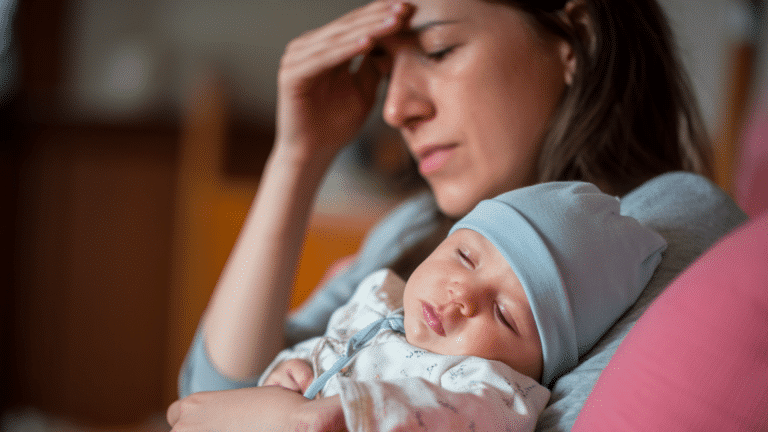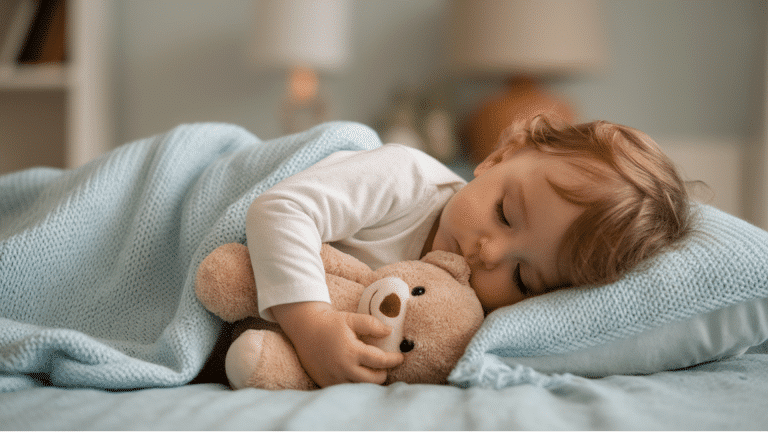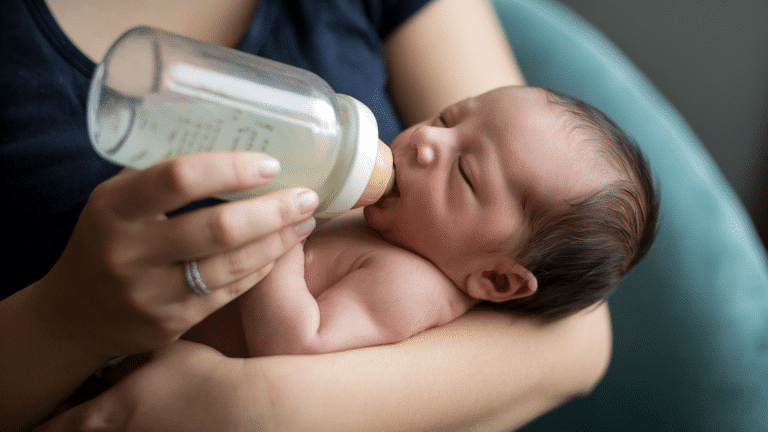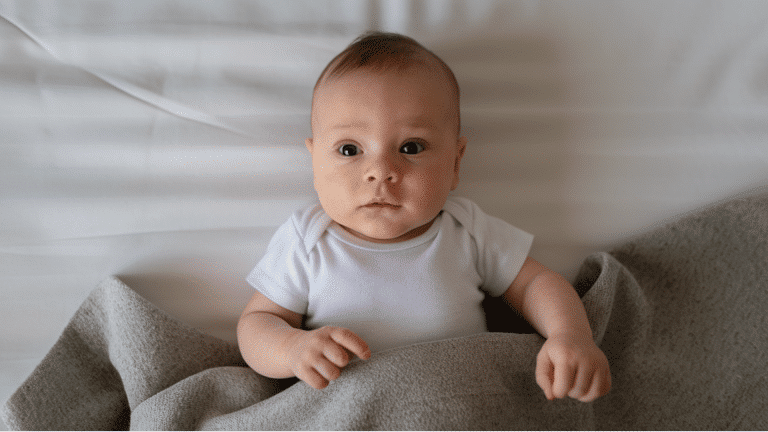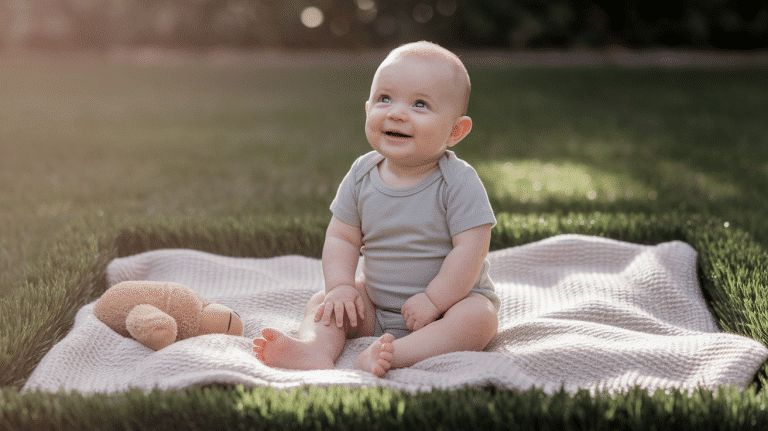Melatonin is a hormone generated by the human body and is essential for regulating sleep-wake cycles. Melatonin for babies is frequently connected with sleep problems.
In this article, we will look at the importance of melatonin in newborns, its involvement in their sleep patterns, and how it may be used to help babies sleep in a better way.
Understanding the significance of melatonin in newborns and its role in regulating the circadian rhythm of sleep is crucial for parents and caregivers.
In the section that follows, we will look more closely at the elements that impact melatonin synthesis in newborns and look at measures to establish good sleep in babies.
Let’s get started!
What is Melatonin?
Melatonin is a hormone produced by the pineal gland, located in the brain. It is essential for the regulation of the circadian rhythm of the body, also known as the sleep-wake cycle.
Melatonin levels increase in response to darkness, signaling to the body that it is time to sleep. The levels of melatonin fall in the morning, helping in waking up.
Melatonin has several additional roles in the body other than controlling sleep. It functions as an antioxidant, assisting in the protection of cells from free radical damage.
Melatonin regulates other hormones and has been shown to impact a variety of physiological functions, including immunological functions and reproduction.
Melatonin pills are available without a prescription. These supplements are frequently used to treat sleep problems such as insomnia and jet lag.
Melatonin for Babies
Babies naturally produce melatonin, but its production and control are still growing throughout the first months and years of life.
If it is feasible, do not give melatonin supplements to newborns. It is advised to let the production of melatonin by their bodies mature naturally.
Melatonin supplements for newborns should be taken only under the supervision and advice of a healthcare expert. If you are worried about the sleeping patterns of your baby, consult a healthcare professional.
While melatonin is widely regarded as safe for short-term usage in adults, its safety and efficacy in newborns are debatable. There are a variety of non-pharmaceutical techniques that can help newborns sleep better.
These are examples of establishing regular bedtime and nap time habits, providing a pleasant sleep environment, minimizing stimulation before sleep, and generating a tranquil setting.
How Do Babies Produce Melatonin?
During pregnancy, the mother’s activity levels greatly influence the baby’s circadian rhythm. When the mother is active, the baby’s heart and breathing rate increase.
When the mother is resting or sleeping, they decrease. Maternal melatonin also crosses the placenta allowing the newborns to sleep while their mothers sleep.
The placental link, however, is severed after delivery. Melatonin may still be passed on to newborns through breast milk.
The baby’s pineal gland will be active shortly after birth, indicating that they will begin to make their melatonin.
So right after the birth of a baby, the melatonin levels are lower, which begin to increase as soon as the pineal gland starts producing melatonin naturally for the baby’s body.
Their sleep habits may be unpredictable at first, and some newborns may suffer day and night disorientation. But gradually their circadian rhythm starts developing.
Between the ages of 8 to 16 weeks, the circadian rhythms will begin to evolve, and they should begin to adopt more consistent sleep habits.
Importance of Melatonin for Babies
Melatonin’s significance for infants is derived from its function in regulating sleep-wake cycles and encouraging good sleep habits.
Melatonin is also associated with the production of other hormones essential for the growth and development of babies.
Let us examine its importance for babies!
1. Regulation of Sleep
Melatonin helps in the regulation of the circadian rhythm. Right after birth, the levels of melatonin in babies are lower, hence you see a distorted sleep-wake cycle in newborns.
As the babies advance in age, the natural production of melatonin increases in the body by the pineal gland. This helps in developing a more stable sleep-wake cycle.
It encourages sleepiness and aids in the processing of settling infants into sleep. It can help children feel calmer and help them fall asleep more quickly, making nighttime rituals easier and more effective.
It helps to promote a deeper, more uninterrupted sleep. It encourages deep and regenerative sleep by helping infants fall asleep for longer periods and lowering nightly awakenings.
2. Cognition
As a result of good sleep, the cognitive functions of the brain are better developed in babies. According to NCBI, two studies were conducted to find a relationship between infant sleep and general cognitive development.
It was found in the first study that greater movement during sleep and greater awakening after the onset of sleep were negatively correlated with BSID-II MDI (Bayley Scales of Infant and Toddler Development second edition Mental Development Index) scores. This study was done for a group of 10-month-old infants.
Whereas, in the second study, greater sleep efficiency was correlated positively with BSID-II MDI scores, for the same group of infants.
3. Synchronization with Environment
It helps infants synchronize their sleep cycles with surrounding involvement by reacting to natural light and darkness cues.
This synchronization with the day-night cycle might help create a regular sleep schedule.
4. General Well Being
A baby’s growth, development, and general well-being depend on getting enough go to sleep.
An infant’s health and crucial development milestones are supported by sufficient sleep, which also promotes the immune system and emotional, cognitive, and brain development.
Side Effects of Melatonin Dosage
Infants should not typically be given melatonin supplements without a doctor’s supervision since the potential adverse effects of melatonin on them have not been well investigated.
Still, here are a few things to think about, which are mentioned below.
1. Disruption in Natural Melatonin
Melatonin supplementation has been linked to disruptions in infants’ normal development and control of melatonin.
It could interfere with the capacity to manufacture melatonin and autonomously create their sleep-wake cycles.
2. Modified Hormonal Balance
Exogenous melatonin administration to infants has the potential to alter the delicate hormonal imbalance in their growing bodies. It is unclear what these disturbances will do long term.
3. Daytime Drowsiness
It is linked to feelings of weariness and drowsiness. A baby who receives melatonin during the day may become very sleepy throughout the day, which might interfere with their ability to eat, play, and go about their regular activities.
4. Digestive Problems
Melatonin consumption has been linked to complaints of gastrointestinal disorders such as cramping in the stomach, nausea, or diarrhea. Babies’ tiny stature and growing digestive systems may make them more susceptible to these consequences.
5. Allergic Reactions
Although uncommon, allergic reactions to melatonin can happen. There might be a rash, itching, swelling, or breathing problems such as symptoms. Any indications of an allergic response should prompt a rapid medical intervention.
Things to Keep in Mind Before Considering Melatonin
It is crucial to remember that the use of melatonin supplements in infants should only be undertaken with the advice and oversight of a medical expert with pediatric sleep medicine experience.
The following considerations must be made when thinking about melatonin usage in infants.
1. Consult a Pediatrician
Before contemplating melatonin supplementation for your kid, always speak with a pediatrician or other healthcare provider with pediatric Sleep Medicine experience. Based on your newborn’s unique requirements and circumstances, they may offer tailored advice.
2. Age and Development
For newborns younger than six months, melatonin supplementation is often not advised. Because their natural melatonin synthesis is still growing, babies’ sleep habits are mostly affected by external influences at this. Using melatonin appropriately for older infants should be reviewed with a medical expert.
3. Underlying Health Conditions
Medications for your infant is taking as well as underlying medical concerns they may have, should be disclosed to the pediatrician. Melatonin may interact with some illnesses or treatments, necessitating extra care.
4. Limited Usage
Melatonin is often prescribed for your infant temporarily to treat particular sleep-related issues. Melatonin administration to newborns for an extended period has not been well explored and should be avoided.
5. Correct Dosage and Administration
If your doctor has prescribed melatonin for your infant, follow the suggested dosage and administration guidelines they have given you. Never administer melatonin over the advised dosage or without consulting a physician.
6. Monitoring
While using melatonin, keep a close eye on your baby’s behavior, sleep patterns, and any potential adverse effects. Inform your pediatrician of any changes or worries you have, and then do as instructed for a follow-up assessment.
Dosage Recommendations
Ideally, a healthcare practitioner, a pediatrician, or a healthcare provider with experience in pediatric sleep medicine should decide on melatonin dosage recommendations for infants.
Before prescribing or advising any melatonin dose, they will take into account the particular requirements and circumstances for your infant.
It’s crucial to remember that there is no suggested dosage for newborns and that neither widespread recommendations nor thorough studies support the use of melatonin supplements in neonates.
The dose, if given, will depend on elements including age, weight, sleep issues, and any underlying health disorders. Each baby’s circumstance is unique.
If your infant needs melatonin supplementation, your pediatrician will give you detailed instructions on how to administer it and how much to give.
Following their instruction and adhering to the suggested dose is essential. Therefore, it is advised to always place a priority on expert medical guidance and oversight when thinking about melatonin or any other supplements for newborns.
Disclaimer: The information in this blog is not a substitute for professional medical advice. It does not prescribe medicines or treatments or imply drug safety or effectiveness. Consult a healthcare professional before making any medical decisions.
Conclusion
All in all, remember that treating sleep disorders in newborns is typically developing healthy sleep habits via non-pharmacological measures, such as establishing a reliable bedtime routine and a relaxing sleep environment.
Supplemental melatonin should only be taught about after great consideration and under a healthcare professional’s guidance.
In summary, melatonin is crucial for regulating sleep-wake cycles and fostering sound sleep habits in infants.
Melatonin usage in newborns, however, is a complicated and unique choice that should be made in cooperation with a medical expert, such as a pediatrician skilled in Sleep Medicine.
While melatonin supplementation is typically not advised for infants, there may be certain circumstances when it may be thought for short-term usage under physician supervision.
Frequently Asked Questions
Is Melatonin Safe for Babies?
Melatonin usage in infants is not well-established to be safe. Before contemplating melatonin supplementation for newborns, speaking with a pediatrician or other healthcare provider with pediatric Sleep Medicine experience is often advised.
How Old Should Newborns Be Before Melatonin Is Considered?
Typically, supplementing with melatonin is not advised for infants younger than six months. A healthcare provider should decide whether or not melatonin should be used on older infants.
What are the Possible Adverse Effects of Melatonin in Young Children?
Its possible side effects and hazards have not been well investigated in infants. Alterations in the hormonal balance, daily sleepiness, intestinal problems, and allergic responses are of few potential complications.
Can Melatonin Aid with My Infant’s Sleep Problems?
Only under medical supervision should melatonin be used to treat sleep problems in infants. It is not a first-line therapy and should only be used after other underlying causes have been addressed and non-pharmacological methods have been attempted.
How Should Ought Melatonin Be Given to Infants?
Follow the dosage and administration guidelines indicated by the healthcare provider if melatonin is suggested for your infant. The dose will depend on several elements, including age, weight, and special demands, and it may be given as a liquid or pill.
Are there Any Melatonin Substitutes that Can Help My Infant Sleep Better?
The initial line of treatment for infant sleep problems is frequently non-pharmacological methods, such as establishing regular bedtime rituals, generating a relaxing sleep environment, and treating any underlying health problems. A healthcare expert should be consulted for more specific advice.








